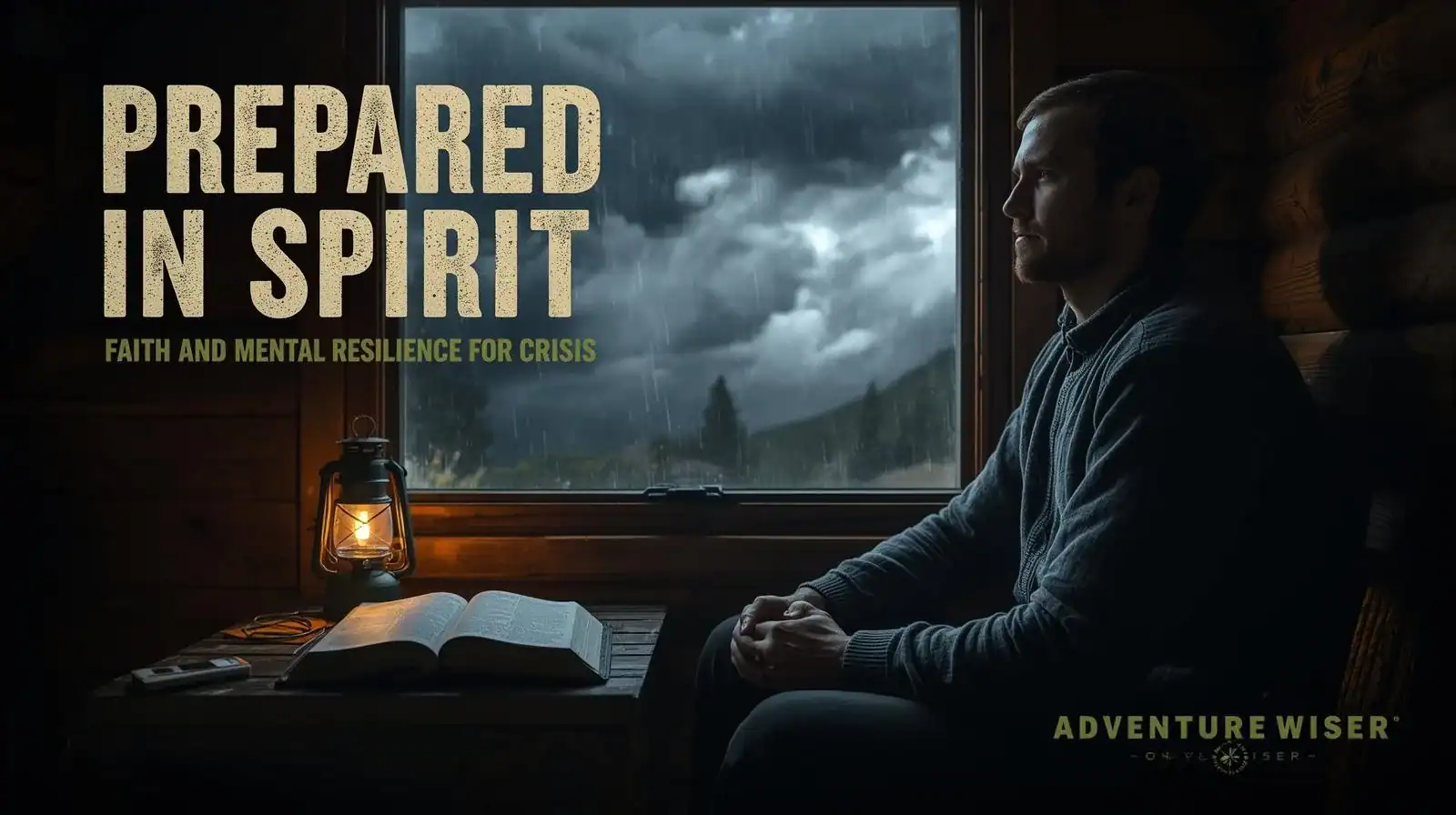
Prepared in Spirit: How Faith and Mental Resilience Keep You Ready When the World Shakes
In times of crisis—whether it’s a power outage, natural disaster, or societal unrest—panic can spread faster than wildfire. The news blares apocalyptic headlines, neighbors pace nervously, and people fight over the last scraps of supplies at the store. But true preparedness isn’t just about stockpiling food or gear; it’s about cultivating mental toughness and spiritual strength to face uncertainty with clarity and calm. This expanded guide explores why faith and mental resilience are the foundation of preparedness, drawing from biblical wisdom and practical strategies to keep you grounded when the world shakes.
The Reality of Crisis: Why Your Mindset Matters

When disaster strikes, chaos often follows. Sirens wail, power grids fail, and the unprepared scramble for solutions. I’ve seen it firsthand: during a prolonged power outage, a man with thousands of dollars in tactical gear lost his composure because his generator failed. Meanwhile, my 80-year-old neighbor, armed with just an oil lamp and canned soup, stayed calm, even hosting coffee for others. The difference? Mental and spiritual preparation.
Your mindset is your most critical asset in a crisis. Gear can break, supplies can run out, but a resilient mind and anchored spirit are renewable resources. Panic is contagious, and if you lose your cool, those around you—your family, friends, or community—will follow suit. Scared people make reckless decisions, but a steady mind leads with clarity and purpose.
Biblical Wisdom for Faith and Mental Resilience
The Bible offers timeless guidance for staying grounded in chaos. It’s not just a spiritual text—it’s a manual for mental resilience. Here are key principles to apply:
1. Replace Panic with Prayer
Philippians 4:6-7 instructs, “Do not be anxious about anything, but in every situation, by prayer and petition, with thanksgiving, present your requests to God. And the peace of God, which transcends all understanding, will guard your hearts and your minds in Christ Jesus.” Anxiety clouds judgment, but prayer shifts your focus, offering perspective and peace. During my military deployments, I learned to pause for a quick prayer before acting in high-stress situations. Those few seconds of centering made all the difference.
2. Embrace Discipline
2 Timothy 1:7 reminds us that God gives us “a spirit not of fear but of power and love and self-control.” Self-control is the ability to think clearly when others are spiraling. It’s the discipline to assess, plan, and act rather than react impulsively. Practicing discipline in everyday life builds the muscle you’ll need in a crisis.
3. Build Community
Ecclesiastes 4:12 states, “A cord of three strands is not quickly broken.” No one survives alone—not for long. The lone-wolf survivalist is a Hollywood myth. Strong communities provide emotional support, shared resources, and collective strength. During Hurricane Sandy, my friend Sarah’s calm faith and teamwork with her family kept them safe, while others faltered in isolation.
Faith and Mental Resilience: Practical Steps to Build Mental Toughness
Mental resilience isn’t innate—it’s built through intentional practice. Here’s how to strengthen your mind and spirit for any crisis:
1. Start Your Day with Purpose
Before checking your phone or diving into the news, spend five minutes grounding yourself. Read scripture, a devotional, or watch a YouTube channel such as Pastor John Lovell that centers your perspective. This sets the tone for your day, shielding your mind from the chaos of social media or sensational headlines.
2. Carry Anchors of Peace
Keep lightweight reminders of your faith or values close at hand. I carry index cards with verses like Philippians 4:13 (“I can do all things through Christ who strengthens me”), Psalm 23, or Isaiah 41:10 in my everyday carry (EDC) kit. In moments of stress, these anchors can redirect your thoughts and prevent panic.
3. Practice Gratitude Daily
Gratitude rewires your brain to focus on positives, even in dark times. Each night, write down three things you’re thankful for, no matter how small. This habit trains your mind to find hope and resilience, even when circumstances feel overwhelming.
4. Train Under Stress
Simulate crisis conditions to build resilience. Try a weekend without power, a camping trip without your phone(that’s a blessing in disguise), or a day of solving problems without modern conveniences. These drills teach you to stay calm and think critically under pressure. The goal isn’t just survival—it’s maintaining clarity and leadership.
5. Limit Exposure to Fear
Stay informed, but don’t drown in doom. Constant news cycles and social media fearmongering are mental junk food. Set boundaries—check reliable sources once or twice a day, then focus on what you can control. Your mind will thank you.
Learning from Biblical Examples of Faith and Mental Resilience

The Bible is filled with stories of ordinary people who demonstrated extraordinary resilience through faith:
- Noah: Built an ark amid ridicule, trusting God’s plan despite societal scorn. His mental fortitude was as critical as the ark itself.
- Paul: Wrote letters of hope and encouragement from a Roman prison, focusing on others’ strength despite his own suffering.
- Job: Lost his family, wealth, and health, yet held fast to his faith, proving that spiritual resilience can withstand even the worst trials. He is my favorite Bible character!
These figures weren’t superhuman—they were human, like us, but their faith and mental discipline carried them through.
Balancing Practical Preparedness with Faith
Some argue that prepping is fear-driven or contradicts faith. Not so. Proverbs 21:20 praises storing up resources, saying, “The wise store up choice food and olive oil, but fools gulp theirs down.” Meanwhile, Matthew 6:34 advises, “Do not worry about tomorrow, for tomorrow will worry about itself.” Practical preparation—stocking food, maintaining gear—is wisdom, not paranoia. Faith complements this by keeping worry in check, ensuring your preparations come from a place of prudence, not fear.
Answering Common Questions
Q: Isn’t prepping just paranoid fear-mongering?
A: Only if it’s rooted in panic. Wise prepping is like wearing a seatbelt: you don’t expect a crash, but you’re ready if it happens. It’s about responsibility, not fear.
Q: How do I balance practical prep with faith?
A: They go hand-in-hand. Prepare your resources as Proverbs advises, but trust in God’s provision as Matthew teaches. One is action; the other is peace.
Q: Does memorizing Bible verses really help in emergencies?
A: Absolutely. Verses like Philippians 4:13 or Psalm 23 are mental anchors, grounding you when adrenaline and fear threaten to take over. It’s practical psychology rooted in faith.
The Bottom Line
Gear can fail, supplies can dwindle, but a prepared mind and anchored spirit are your greatest assets. Faith isn’t a luxury—it’s the foundation that keeps you steady when the world shakes. It gives you clarity to make tough decisions, strength to lead others, and hope to endure. Stock your pantry, maintain your tools, but above all, cultivate mental toughness and spiritual resilience. When the lights go out and the sirens wail, that’s what will carry you through.
Pro Tip (Gear Tie-In)
Just like you keep a Black Beard fire starter in your pack, keep a small pocket Bible or verse cards in your kit. Fire keeps you warm; faith keeps you steady. Both belong in your survival loadout.
Heads-Up, Fellow Preppers:
Some links in this post are sponsored or affiliate links. If you click and buy, I may earn a small commission—enough to restock my peanut butter and maybe add one more can of chili to the stash. I only recommend gear I trust, use, and would hide in a bug-out bag.






